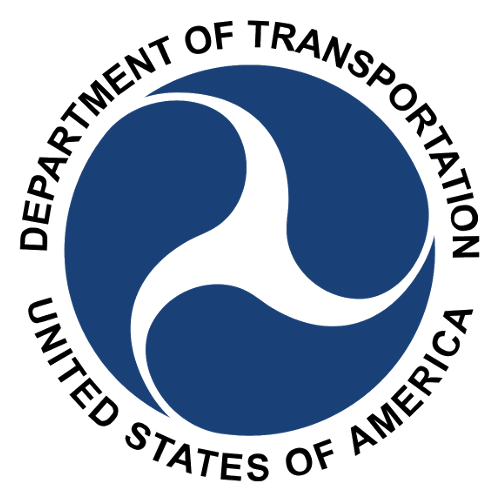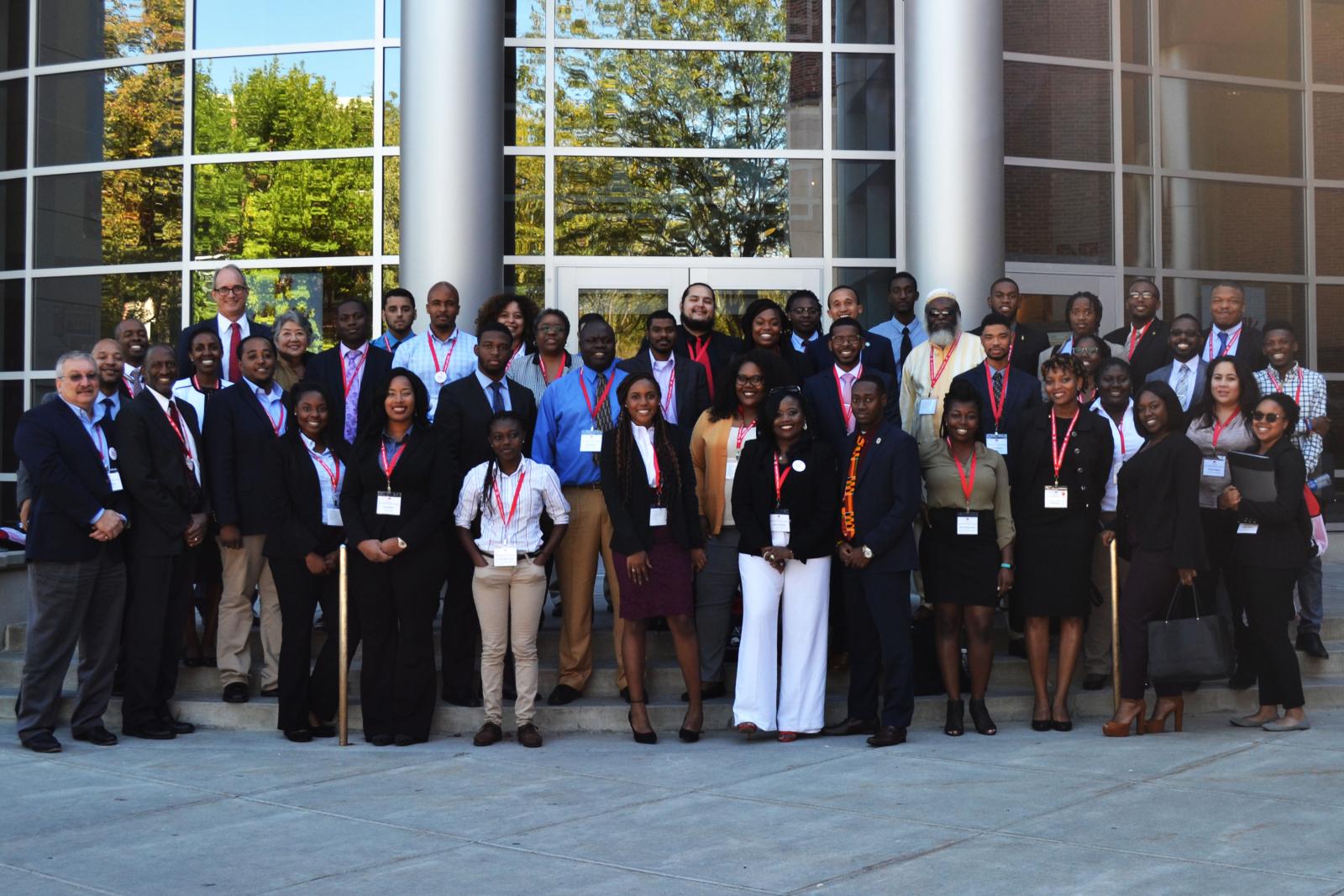The 2017 Scholars Program for Historically Black Colleges and Universities (MBCUs) and Hispanic-Serving Institutions (HSIs) was held to promote graduate study among underrepresented groups in STEM fields with a special focus on doctoral-granting and research-intensive institutions.
Students attended seminars held on the campus of the University of Nebraska-Lincoln and led by a diverse group of faculty members and industry professionals from across the nation, providing students with a unique networking opportunity.
Session Topics:
Why Graduate School?
Now that you have completed your undergraduate degree, there are several career options to be considered. Graduate school is an extremely viable option to not only consider, but actually pursue. The benefits to attending graduate school to obtain an advanced degree and endless and so are the reasons to pursue one.
This session covers some of the major reasons that individuals attend to pursue advanced degrees, graduate school preparation, factors to consider when beginning the graduate application process, benefits of obtaining a graduate degree, and the various career paths of those that have graduate degrees in the transportation, science, technology, engineering, and mathematics (STEM) fields.
Choosing a Graduate Program: Making a Short List
The nuances of choosing a graduate program in the context of the student's background, financial environment, and relative quality of the programs of interest are articulated. How the issues of online versus traditional coursework considerations as well as maters to doctoral decision-making process affect the ultimate path taken to achieve the student's graduate school goals is discussed. A synopsis of the process of identifying, evaluation, and choosing a program compatible with the needs of the prospective graduate will be examined. Also, the basics of how to create a competitive application packet that contains GRE scores, personal statements and letters of recommendation will be covered.
Understanding Funding and Budgeting Finances
This session provides students a working knowledge of the process of receiving funds as a graduate student and/or a research assistant. It describes the risks of losing funding due to things such as poor work ethic or program funds eliminated by the funding agency. Establishing a budget, savings, and investing strategies that are flexible enough to support a student with or without funding are discussed.
Other topics include: strategies for supporting faculty to receive additional funding in order to possibly increase a student's stipend, graduate assistant work ethic, maintaining funding as a master or doctoral student, and teaching and research.
Communication Skills
This session will address the components of active communication; written and oral. The importance of appropriate writing and speaking in academic and corporate settings will be stressed. In the interactive session, participants will be challenged to improve their communication skills through hands-on activities and oral activities. Participants will develop and/or critique their personal statements. Emphasis will also be placed on understanding the role of non-verbal communication cues.
Graduate School Student Experience
Since graduate school is an advanced level of learning compared to undergraduate studies, it is associated with new challenges that students must prepare for. Students need to know how to choose a program of study, meet admission requirements and advisor expectations, connect with the right groups, and register for the right classes. Further, a student’s mentality, networking with other students, and expectations from the faculty advisor are all part of the challenges that a graduate student will face. This session will discuss the graduate school challenges and will targets different experiences a graduate student should expect throughout their program.
Choosing Faculty Mentors & Finding “Mentoring Communities” for Academic Success
Mentoring in graduate school provides students with coaching, counseling, and nurturing support essential to developing academically, personally, and professionally. This session provides information on how to identify and select a faculty mentor and mentors from other communities.
The topics covered include: students’ perspectives of faculty mentors, what to look for in a faculty mentor and finding good match, the benefits of a positive mentor/mentee relationship, what is expected from a mentor, the social environment of graduate school, the difference between a faculty mentor and an academic advisor, and insight into what students may experience during grad school. The goal of this session is to show that faculty mentors and mentoring communities are essential to the success of graduate students.
Program Schedule
Wednesday, September 27, 2017
| Time | Agenda Item | Speaker(s) | Location |
|---|---|---|---|
| 6:00 PM | Arrival and Check-In | Hyatt Place/Downtown Haymarket 600 Q Street, Lincoln, NE 68508 |
|
| 7:00 PM | Welcome Reception | Hyatt Place |
Thursday, September 28, 2017
The Why and How of Graduate School
| Time | Agenda Item | Speaker(s) | Location |
|---|---|---|---|
| 6:30 - 7:15 AM | Breakfast | Hyatt Place | |
| 7:15 - 7:30 AM | Transition from Hyatt Place to UNL City Campus | ||
| 7:45 - 8:15 AM | Pre-Conference Assessment | Bureau of Sociological Research (BOSR), UNL | Heritage Room, UNL City Campus, Campus Union, 2nd Floor |
| 8:15 - 8:30 AM | UNL Welcome and MATC Introduction | Dr. Laurence Rilett, P.E. | Heritage Room |
| 8:30 - 8:50 AM | Overview of the MATC Scholars Program | Dr. Judy Perkins, P.E. | Heritage Room |
| 8:50 - 8:55 AM | Welcome from the Chancellor | Dr. Steve Goddard | Heritage Room |
| 8:55 - 9:00 AM | Break | ||
| 9:00 - 9:40 AM | Rotation 1 | ||
| Group 1 Why Graduate School? |
Mr. Juhann Waller, P.E. | Heritage Room | |
| Group 2 Graduate School Student Experiences |
Dr. Deo Chimba, P.E. | Georgian Suite, Union, 2nd Floor | |
| 9:40 - 10:20 AM | Rotation 1 | ||
| Group 1 Choosing a Graduate Program: Making a Short List |
Dr. Ibibia Dabipi | Heritage Room | |
| Group 2 Choosing Faculty Mentors & Finding “Mentoring Communities” for Academic Success |
Dr. Edgar Blevins | Georgian Suite | |
| 10:20 - 10:30 AM | Break | ||
| 10:30 - 11:10 AM | Rotation 2 | ||
| Group 1 Graduate School Student Experiences |
Dr. Deo Chimba, P.E. | Heritage Room | |
| Group 2 Why Graduate School? |
Mr. Juhann Waller, P.E. | Georgian Suite | |
| 11:10 - 11:50 AM | Rotation 2 | ||
| Group 1 Choosing Faculty Mentors & Finding “Mentoring Communities” for Academic Success |
Dr. Edgar Blevins | Heritage Room | |
| Group 2 Choosing a Graduate Program: Making a Short List |
Dr. Ibibia Dabipi | Georgian Suite | |
| 12:00 - 1:00 PM | Lunch | Dr. Velvet Basemera-Fitzpatrick, P.M.P. | Unity Room, 212 |
| 1:00 - 1:30 PM | Group Photos | ||
| 1:30 - 2:30 PM | GEM Overview and Opportunities | Dr. Marcus Huggans | Heritage Room |
| 2:30 - 2:45 PM | Break | ||
| 2:45 - 3:45 PM | Graduate School Admissions Exams Overview | Mr. Douglas McLemore | Heritage Room |
| 3:45 - 4:15 PM | Explore Union and Visit University Bookstore | ||
| 4:15 - 4:45 PM | Tour UNL City Campus and Walk to Memorial Stadium | ||
| 4:45 - 6:00 PM | Memorial Stadium Tour | One Memorial Stadium Drive, Lincoln, NE 68588 | |
| 6:00 - 8:00 PM | Dinner & Network with UNL Faculty and Graduate Students | WHIT Pre-Function Space, Rm 251 | |
| 8:00 PM | Transition to Hyatt Place | ||
Friday, September 29, 2017
Strategies for Succeeding in Graduate School
| Time | Agenda Item | Speaker(s) | Location |
|---|---|---|---|
| 7:00 - 8:30 AM | Breakfast | Hyatt Place | |
| 8:30 - 8:45 AM | Transition from Hyatt Place to Prem S. Paul Research Center at Whittier School (WHIT) | ||
| 9:00 - 9:40 AM | Rotation 3 | WHIT, 2200 Vine Street | |
| Group 1 Communication Skills |
Ms. Amy Maki, M.Ed. | WHIT 152 | |
| Group 2 Understanding Funding and Budgeting Finances |
Dr. Luis Vázquez | WHIT 136 | |
| 9:40 - 10:20 AM | Rotation 4 | ||
| Group 1 Understanding Funding and Budgeting Finances |
Dr. Luis Vázquez | WHIT 152 | |
| Group 2 Communication Skills |
Ms. Amy Maki, M.Ed. | WHIT 136 | |
| 10:20 - 10:30 AM | Break | ||
| 10:30 - 11:00 AM | UNL Graduate Studies: Meeting with the Dean | Dr. Lance Pérez | WHIT 152 |
| 11:00 - 11:30 AM | NSF Graduate Research Fellowship and Internship Program | Dr. Erick Jones, P.E., CSSMBB, MSIE | WHIT 152 |
| 11:30 AM - 12:00 PM | Research Experiences for Undergraduates | Dr. Timothy Carr | WHIT 152 |
| 12:00 - 1:15 PM | Lunch | Mr. Kevin Jones | WHIT |
| 1:15 - 1:30 PM | Transition from Lunch to Sessions | ||
| 1:30 - 2:00 PM | Future of the Transportation Workforce | Ms. Elaine Armster | WHIT 152 |
| 2:30 - 3:30 PM | Voices from the Field: UTCRS REUs and MATC Interns | Ms. Sherman Livingston Mr. Oscar Peña Ms. Luz Sotelo Mr. Ricardo Jacome Ms. Rubi Quiñones |
WHIT 152 |
| 3:30 - 3:45 PM | Break & Ice Cream Sundaes | ||
| 3:45 4:45 PM | The Road to a New Tohoku: Rebuilding after the 2011 Great East Japan Earthquake and Tsunami | Dr. Terri Norton | WHIT 152 |
| 4:45 - 5:30 PM | Focus Group Dialogue and Assessment | Bureau of Sociological Research (BOSR), UNL | WHIT |
| 5:30 - 6:00 PM | Transition from Prem S. Paul Research Center to Morrill Hall | ||
| 6:00 - 8:00 PM | Closing Dinner | Dr, Yvette Pearson, P.E., F.ASCE | Morrill Hall 645 North 14th Street |
| 8:00 PM | Transition to Hyatt Place | ||
Saturday, September 30, 2017
Highlights from MATC Region 7 Institutions
| Time | Agenda Item | Speaker(s) | Location |
|---|---|---|---|
| 8:00 - 9:00 AM | Breakfast | Hyatt Place | |
| 9:00 - 9:15 AM | Transition from Breakfast to Sessions | ||
| 9:15 - 10:00 AM | Transportation Careers | Dr. Laurence Rilett, P.E. | Hyatt Place |
| 10:00 - 10:45 AM | Future Logistics | Ms. Andria Hendricks, MBA, MA | Hyatt Place |
| 10:45 - 11:30 | Post-Survey | Bureau of Sociological Research (BOSR), UNL | Hyatt Place |
| 11:30 - 11:45 AM | Closing Remarks | Dr. Laurence Rilett, P.E. | Hyatt Place |
| 11:45 | Boxed Lunches and Adjourn | ||

